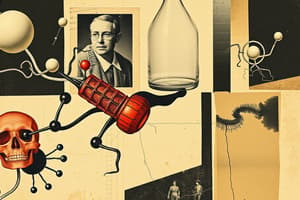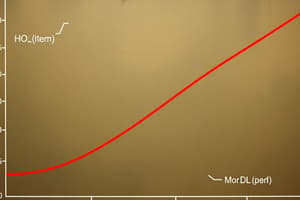Podcast
Questions and Answers
What is the cofactor used by acetyltransferase in the acetylation process?
What is the cofactor used by acetyltransferase in the acetylation process?
- Acetyl CoA (correct)
- Glutathione
- 3’-phosphoadenosine-5’-phosphosulfate
- NADH
Which enzyme is responsible for transferring methyl groups to catecholamines?
Which enzyme is responsible for transferring methyl groups to catecholamines?
- Sulfotransferase
- Acetyltransferase
- DNMT
- COMT (correct)
What genetic variation is characteristic of 'poor' metabolizers?
What genetic variation is characteristic of 'poor' metabolizers?
- Duplication of gene alleles
- Increased enzyme activity
- Homozygosity for mutations (correct)
- Reduced levels of substrate
Which phase II metabolic process can result in more lipophilic forms of a drug?
Which phase II metabolic process can result in more lipophilic forms of a drug?
What might result from individuals who are rapid acetylators when treated with isoniazid?
What might result from individuals who are rapid acetylators when treated with isoniazid?
Which polymorphism is characterized by variants that slow down the activity of CYP2D6?
Which polymorphism is characterized by variants that slow down the activity of CYP2D6?
What type of reaction is methylation considered in post-translational modifications?
What type of reaction is methylation considered in post-translational modifications?
Which CYP enzyme's polymorphism is specifically linked to low metabolic activity in Chinese populations?
Which CYP enzyme's polymorphism is specifically linked to low metabolic activity in Chinese populations?
Which of the following factors can modulate the metabolism of caffeine?
Which of the following factors can modulate the metabolism of caffeine?
What type of reactions are Phase II reactions primarily characterized as?
What type of reactions are Phase II reactions primarily characterized as?
Which of the following functions as a cofactor in the glucuronidation reaction?
Which of the following functions as a cofactor in the glucuronidation reaction?
Which enzyme is primarily associated with glucuronidation?
Which enzyme is primarily associated with glucuronidation?
What is the main role of glutathione-S-transferase (GST) in Phase II reactions?
What is the main role of glutathione-S-transferase (GST) in Phase II reactions?
Which of the following Phase II reactions does NOT involve ATP consumption?
Which of the following Phase II reactions does NOT involve ATP consumption?
What role does glutathione conjugation serve in the detoxification process?
What role does glutathione conjugation serve in the detoxification process?
Which of these functional groups is NOT typically involved in Phase II reactions?
Which of these functional groups is NOT typically involved in Phase II reactions?
Which organ is NOT mentioned as having UDP-glucuronyl transferase activity for glucuronidation?
Which organ is NOT mentioned as having UDP-glucuronyl transferase activity for glucuronidation?
What is a common substrate for glucuronidation?
What is a common substrate for glucuronidation?
In the context of Phase II reactions, which statement about energy consumption is true?
In the context of Phase II reactions, which statement about energy consumption is true?
What characterizes pharmacodynamic interactions?
What characterizes pharmacodynamic interactions?
Which scenario describes pharmacokinetic interactions?
Which scenario describes pharmacokinetic interactions?
What is a potential positive outcome of drug interactions?
What is a potential positive outcome of drug interactions?
What is a common misconception about drug interactions?
What is a common misconception about drug interactions?
What defines a scenario of drug inactivation outside the organism?
What defines a scenario of drug inactivation outside the organism?
Which statement regarding drug interactions is true?
Which statement regarding drug interactions is true?
In what way can drug A affect drug B pharmacodynamically?
In what way can drug A affect drug B pharmacodynamically?
What is a primary goal when studying drug interactions in a clinical setting?
What is a primary goal when studying drug interactions in a clinical setting?
What does it mean if drug interactions are beneficial?
What does it mean if drug interactions are beneficial?
Which of the following is NOT true regarding drug interactions?
Which of the following is NOT true regarding drug interactions?
What is the primary risk associated with individuals who have a mutation in the succinylcholine esterase enzyme?
What is the primary risk associated with individuals who have a mutation in the succinylcholine esterase enzyme?
Which factor primarily affects metabolic activity in newborns related to drug metabolism?
Which factor primarily affects metabolic activity in newborns related to drug metabolism?
What is the consequence of enzymatic induction in drug metabolism?
What is the consequence of enzymatic induction in drug metabolism?
What type of drug interaction occurs when one drug inhibits the metabolism of another drug?
What type of drug interaction occurs when one drug inhibits the metabolism of another drug?
Which enzyme family is mainly involved in drug metabolic interactions?
Which enzyme family is mainly involved in drug metabolic interactions?
What nutritional factor is known to decrease enzymatic activity affecting drug metabolism?
What nutritional factor is known to decrease enzymatic activity affecting drug metabolism?
How does chronic alcohol abuse influence cytochrome activity related to drug metabolism?
How does chronic alcohol abuse influence cytochrome activity related to drug metabolism?
What is the primary effect of the gray baby syndrome in relation to drug metabolism in newborns?
What is the primary effect of the gray baby syndrome in relation to drug metabolism in newborns?
Which drug interaction mechanism can lead to an increased level of terfenadine when co-administered with erythromycin?
Which drug interaction mechanism can lead to an increased level of terfenadine when co-administered with erythromycin?
Which of the following is NOT a characteristic of enzymatic induction in drug metabolism?
Which of the following is NOT a characteristic of enzymatic induction in drug metabolism?
Flashcards are hidden until you start studying
Study Notes
Phase II Reactions Overview
- Phase II reactions are biosynthetic processes conjugating Phase I metabolites with endogenous compounds.
- Key functional groups involved: –OH, COOH, -NH2, -SH.
- These reactions require ATP for cofactor activation, utilizing enzymes typically found in the cytoplasm.
Key Phase II Reactions
- Glucuronidation: Predominant Phase II reaction involving UDP-glucuronyl transferase; substrate range includes alcohols, phenols, amines, and others.
- Sulfation: Utilizes 3’-phosphoadenosine-5’-phosphosulfate (PAPs) with sulfotransferase enzyme; substrates include phenols, alcohols, and amines.
- Methylation: A post-translational modification catalyzed by methyltransferases, affects both proteins and DNA; crucial for gene expression regulation.
- Acetylation: Uses acetyl CoA and led by acetyltransferase; can create more lipophilic drug forms and is significant in neurotransmitter synthesis.
- Conjugation with Amino Acids and Glutathione: Important for detoxifying various substances, including toxins like aflatoxin.
Role of Glutathione
- Glutathione-S-transferase (GST) plays a vital role in detoxification; facilitates the conjugation of modified xenobiotics to glutathione, promoting active transport out of the cells.
Genetic Factors in Drug Metabolism
- Genetic polymorphisms influence metabolic capacity, classified into "poor" or "rich" metabolizers based on enzyme activity.
- Acetylation Phenotypes: Slow and rapid acetylators impact drug metabolism and side-effect profiles (e.g., isoniazid).
- Cytochrome P450 Polymorphisms: Variants CYP2C19, CYP2D6, and CYP2C9 significantly affect drug metabolism, leading to varied therapeutic effects and toxicity.
Physiological and Pathological Influences
- Age: Newborns exhibit reduced hepatic function, while the elderly show decreased oxidative metabolism.
- Hepatic Diseases: Serious liver conditions can profoundly impact drug metabolism.
Metabolic Drug Interactions
- Two primary types:
- Enzymatic Induction: Increase in enzyme synthesis leading to reduced drug effectiveness (e.g., due to chronic administration of certain drugs).
- Enzymatic Inhibition: Involves immediate enzyme activity blockade, can elevate drug levels and enhance toxicity risk.
Nutritional Factors
- Nutrition influences biotransformation; deficiencies in vitamins or minerals can hinder enzyme activity.
- Certain food compounds, like those from grapefruit juice, can inhibit cytochrome enzymes, affecting drug metabolism.
Drug Interactions Explained
- Interactions can occur pharmacodynamically (altering drug action without concentration changes) or pharmacokinetically (changing drug concentration at the action site).
- Outside the organism interactions can also lead to inactivation or reduced efficacy of mixed drugs before administration.
Studying That Suits You
Use AI to generate personalized quizzes and flashcards to suit your learning preferences.




